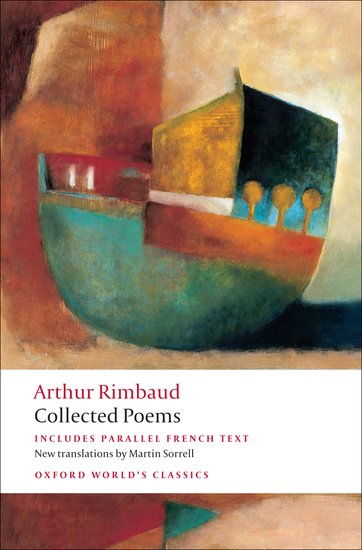
By Martin Sorrell
Among the enfants terribles of literature, Rimbaud holds a pre-eminent place. But he’s been made famous against his will. If he had his way, everything he wrote — save perhaps his factual letters from Africa and elsewhere about trade and the dodgy deals he was trying to clinch – would have been destroyed. All the astonishing poetry that has made him an icon burnt on a bonfire of vanities, but fortunately it was saved. He issued his order to burn at the ripe age of roughly 21, by which time he was through with all artistic pretentions. As he put it in one of the Illuminations, he’d seen and done it all (‘Assez vu… Assez eu… Assez connu’). If, he implied, he’d had the gall to think he could do great things with poetry, change the world no less, now he’d been disabused. Henceforth, for the 16 odd years of life left to him, the book of poetry was resolutely shut. No more chasing the Vision; now, just the ledgers of commerce.
Arthur Rimbaud was born in 1854 in Charleville-Mézières, N.E. France. His relationship with his parents was deeply troubled. His mother was cruel and had no time whatsoever for his scribblings. Fortunately, a couple of his enlightened school teachers did. They saw the precocity, the budding genius of a boy scarcely into his teens who was writing impeccable Latin verse exercises, soon followed by truly original French poems of his own: unique, technically brilliant, disturbed, and dissatisfied poems of restlessness, yearning, and reaching for the unknown; sharp, angular poems such as the satirical ‘A La Musique’, the merciless ‘Les Assis’, the political jab of ‘Rage des Césars’.
Aged 17, Rimbaud had had enough of Mézières, so he walked to Paris, met Verlaine, behaved like a lout, and seduced the weak-willed Verlaine off to London, Brussels, and prison (that’s a whole other story). By now, Rimbaud’s poetry had moved on and was breaking new ground as he left behind his predictable bourgeois targets, and went soaring and sailing among his visions. In ‘Le Bateau ivre’ (the Drunken Boat), he’s left us a masterpiece. Read it and at the same time read his famous ‘Lettre du voyant’ (the Visionary’s Letter). Both date from 1871. If the letter talks of visions, the poem is the Vision. The letter calls for a whole new way of being no less, individually, and by happy extension, collectively. It sets out how the true poet must work pitilessly on himself to become a visionary. There must be a dérèglement de tous les sens, the unshackled cultivation of all sensory experience. Swallow poison, cover yourself in ulcers, turn your body and mind into a laboratory of experiments, pay no heed to personal discomfort and damage. And if you’re half-destroyed in the process, so be it. The reward will be that you arrive at The Unknown.
But the dazzling ambitions of the letter were in the end more illusion than illumination. That’s how the defeated Rimbaud saw it anyway. Alongside the magnificent poems in verse, alongside those enigmatic bulletins from the Unknown, the Illuminations, encrypted in irreducible prose, you have to read Une Saison en enfer, the 19-year-old Rimbaud’s season in hell. It’s his bitter farewell to his old self, a disgusted note of poetic suicide. Goodbye to the Unknown, to his boast that he could lead us there. It’s goodbye to his partner-in-poetry Verlaine, goodbye to the dark land of his mother, goodbye to Europe and what he calls its ‘ancient parapets’, and a scornful, self-castigating goodbye to poetry, to reading and writing and thinking about the stuff. From the collapse of the dream to his premature and wretched death in 1891, aged 37, lying riddled with cancer in a Marseille hospital, minus an amputated leg, Rimbaud plunged into the solitary, peripatetic life of soldier, deserter, circus act, quarry foreman, and gun-runner. He walked everywhere, across Europe and into the Horn of Africa, intent only on securing the material things of this mercantile world. From the poet with the wind in his heels, as Verlaine once described him, Rimbaud finished up a dealer in death, trying to sell rusting rifles to an African king.
The sad and exemplary defeat of Art, apparently. Yet, because certain people neglected to do his bidding and burn his writings, Rimbaud has an unwished-for place in the high temple of literature. The density and power of his work are out of proportion to its modest dimensions. He’s become a secular god, an inspiration for so many other great artists as well as hopeless and hapless idealists. Not a benign god, you sense. If this lean and self-punishing ascetic limped back, he’d have little time for our self-indulgent ways. We’d have to keep our precious copies of his poetry out of sight of those piercing blue eyes; he’d be sure to burn them.
Martin Sorrell is a Professor of French and Translation Studies at the University of Exeter and the editor and translator of Arthur Rimbaud’s Collected Poems, Oxford World’s Classics edition.
For over 100 years Oxford World’s Classics has made available the broadest spectrum of literature from around the globe. Each affordable volume reflects Oxford’s commitment to scholarship, providing the most accurate text plus a wealth of other valuable features, including expert introductions by leading authorities, voluminous notes to clarify the text, up-to-date bibliographies for further study, and much more.
Subscribe to the OUPblog via email or RSS.
Subscribe to only literature articles on the OUPblog via email or RSS.
View more about this book on the ![]()
![]()



Recent Comments
There are currently no comments.